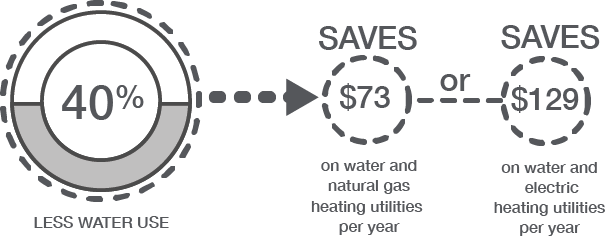Evolve
Single-Function Showerhead, Chrome, 1.5 GPM
Say hello to a better shower! This showerhead provides a great feeling shower regardless of water pressure. It features a 54 nozzle full body spray and is both WaterSense and cUPC certified.
This Showerhead:
- Includes a full body spray pattern
- Features a chrome polish finish
- Includes 54 rub-clean, anti-clog spray nozzles
- Is designed with pressure compensating flow regulation
- Certified WaterSense and cUPC
Product Warranty: 3 Years
Flow Rate
A flow rate is the measurement of water per minute that flows out of your showerhead. They are usually measured in gallons per minutes or GPM. A standard showerhead has a flow rate of 2.5 GPM. This showerhead has a maximum flow rate of 1.5 GPM for increased efficiency.

Saving Water Saves Energy
Saving water also saves energy by reducing the amount of energy used to heat water. The savings differ whether you have an electric or natural gas hot-water heater. This showerhead is 40% more efficient than a standard 2.5-GPM showerhead and can potentially $72 with natural gas heating utilities per year and $129 with electric heating utilities per year.*

Factors in calculating savings potential:
-
3-person households each using a shower 9 minutes per day, 365 days per year (AWWARF Residential Study)
-
Comparing water use with these showerheads vs. a standard 2.5 GPM unit
-
US city average water and sewer cost of $8.3 per 1,000 gallons (study done by NUS Consulting Group 2011)
-
Calculations done by http://www.fishnick.com/savewater/tools/watercalculator
 US Dollars
US Dollars




















